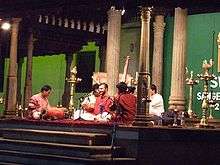Aswathi Thirunal Rama Varma
Aswathi Thirunal Rama Varma, better known as Prince Rama Varma, is an Indian classical musician and a member of the erstwhile Royal Family of Travancore. He is a Carnatic vocalist as well as an exponent of the Veena. He is also recognised as a music teacher, musicologist, writer and orator. He has given concerts and conducted music workshops all over India and in several other countries including USA, UK, Netherlands, France, UAE, Malaysia and Singapore. YouTube videos of his concerts, classes and lecdems are popular among music lovers, music students and professional musicians alike, and have exceeded 50 lakh (5 million) views.
Prince Rama Varma | |
|---|---|
 | |
| Background information | |
| Birth name | Sree Padmanabhadasa Aswathi Thirunal Rama Varma |
| Born | 13 August 1968 Thiruvananthapuram, Kerala, India |
| Genres | Carnatic classical music |
| Occupation(s) | Singer, veena player, writer. |
| Years active | 1990 – present |
| Website | ramavarma |
Early life
Rama Varma was born on 13 August 1968 and is a member of the Royal Family of Travancore.[1][2]
He started formal vocal music lessons in 1982 under Prof. Vechoor Harihara Subramania Iyer, a senior disciple of Dr. Semmangudi Srinivasa Iyer, who continued to be his Guru until his demise in 1994. Later, Varma went on to become a senior disciple of Dr. Mangalampalli Balamuralikrishna.[2][3] He also studied the Saraswathi Veena under Sri Trivandrum R. Venkataraman and Prof.K. S. Narayanaswamy.
Music career
Prince Rama Varma gave his maiden public performance in 1990, and released his first CD at the Queen Elizabeth Hall in London. Since then, he has given concerts and talks in several notable venues across the globe including Arsenal de Metz, France; Zuiderpershuis, Belgium; the Royal Tropical Institute and The Waag, Amsterdam; the Korzo Theatre in The Hague; The Hindu Lit for Life Literary festival; Alliance Francaise and the Madras Music Academy. He was invited to perform at the Rashtrapati Bhavan by the then president of India, Dr. A. P. J. Abdul Kalam.[4]
Varma is recognized for his pioneering efforts to make classical music in its purest form appealing to the masses, by explaining the lyrics and background of every song during his concerts. His renditions are marked by purity of notes and clarity in enunciation of lyrics in any language. Through his concerts, he propagates rare compositions of well-known composers such as the Trinity, Maharaja Swati Tirunal, Annamacharya and Dr. M. Balamuralikrishna, as well as compositions of lesser-known composers such as Etla Ramadasa, Kaiwara Amara Nareyana, Prayaga Rangadasa and Mallekonda Ramadasa. A fan of world music, Varma is inspired by Mozart, Beethoven, Bach, Kishore Kumar, K.L. Saigal, M.D.Ramanathan, Madurai Mani Iyer, Jacques Brel and Eartha Kitt among others. Varma has been interviewed several times, and in 2018, his fan and one true admirer Lakshmy Menon wrote a book on him. [5]
Teaching
Rama Varma's music classes and workshops are popular among music students ranging from beginners to professional musicians in India and abroad. He taught Indian music at the Rotterdam Conservatory, Codarts for many years. The Sri Venkateswara Bhakti Channel (SVBC) telecast over 200 episodes of his music lessons held at Hyderabad and at Perla, a small village in North Kerala. Varma attempts to transcend language barriers in music through his workshops by teaching, for instance, Rabindra Sangeet to Kannada-speaking students and Malayalam compositions to students in Andhra Pradesh.
Music festivals

Prince Rama Varma organises the Swathi Sangeethotsavam, a 10-day annual festival held at the Kuthira Malika in Thiruvananthapuram from 4–13 January. The festival, dedicated exclusively to the compositions of Maharaja Swathi Thirunal, features maestros of Carnatic and Hindustani music, and attracts music aficionados from all over the globe.
Varma also organises the annual Navarathri Mandapam concerts held in Trivandrum in connection with the Navarathri Festival . In 2006, he got veteran vocalist Parassala Ponnammal to perform there, and permitted women to attend the concerts, thus breaking a 300-year-old tradition of not allowing women inside the Mandapam.
References
- Ramakrishnan, Deepa H. (26 February 2005). "Royalty's humble face". The Hindu. Retrieved 4 December 2013.
- "Jamming at a jugalbandi". The Hindu. 2 May 2002. Retrieved 4 December 2013.
- "A new experience". The Hindu. 8 August 2005. Retrieved 27 March 2014.
- "Prince Rama Varma". Webindia123. Retrieved 4 December 2013.
- https://www.goodreads.com/book/show/42849436-prince-rama-varma
External links
| Wikimedia Commons has media related to Aswathi Thirunal Rama Varma. |